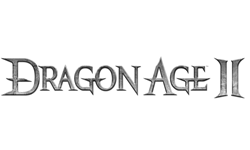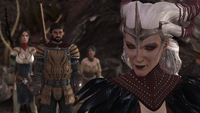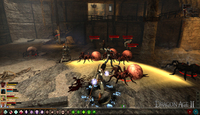|
|

|
PLATFORM
|
PC
|
BATTLE SYSTEM
|

|
INTERACTION
|

|
ORIGINALITY
|

|
STORY
|

|
MUSIC & SOUND
|

|
VISUALS
|

|
CHALLENGE
|
Easy
|
COMPLETION TIME
|
40-60 Hours
|
|
OVERALL

|
+ Excellent battle system
+ Pacing issues from Origins are gone
+ Can roleplay in conversations
- Weak, uninteresting story
- Repeated combat setups and environments
- A bland sameness infects all parts of the game
|
Click here for scoring definitions
|
|
|
Dragon Age: Origins, for better or for worse, was an old-school game that harkened back to BioWare's Infinity engine titles from the turn of the century. Combat was slow and tactical, with gamers needing to pause frequently to babysit each party member's every action, earning as detractors those who want current gen games to play differently from previous gen games. As a role-playing game goes, the story excelled at presenting tough choices which would permanently affect the world and its people, and the smart script made the characters endearing and entertaining. Dragon Age II fixes the combat problems while attempting not to alter what wasn't broken, but due to the unbelievably short design and development schedule, it comes across like a Mass Effect 2.5/Dragon Age 1.5 hybrid that combines all of BioWare's best ideas into one game without taking the time to execute them on the high level we've come to expect.
Not really a sequel as much as a game that happens to take place in the same world, Dragon Age II's plot connections to Origins start and end in the opening sequence where the protagonist flees Lothering during the Blight in Ferelden. The ballyhoo about importing Origins's saves into DA2 was all hot air, as BioWare made no attempt to live up to its promises; outside of a short guest appearance or two if specific DAO conditions are met, the only references to an imported save are a few inconsequential side comments. That said, DA2 does utilize the deep history of the setting without breaking continuity or adding something that wouldn't belong in Origins's world. Those who never played Origins might feel slightly lost at the start since it assumes the player is familiar with the setting in general.
It is made known at the beginning that Dragon Age II's tale is being told by Varric, a friend of the Champion, to a Templar interrogator ten years after the opening cutscene. It piques interest immediately. Why is the protagonist, Hawke, called Champion? Why are the Templar angrily looking for him now? There are a couple of times where Varric describes an event in an exaggerated manner and must retell it, making the player go through the same scene twice — once in a mythical, idealized scenario, and then again as it really happened. It's a fun trick that no other game has pulled off like this, but unfortunately it is hardly used. As the years roll by, the segue pieces showing Varric are so vague that it's clear the script was written only one way. No matter what the player does, he becomes the Champion the same way, moves through life in the same manner, and his current residence of Kirkwall is affected by the same events. It takes the wind out of the sails compared to what BioWare's other recent games have accomplished in terms of making tough choices that matter. Dragon Age II features uninteresting choices that don't matter from start to finish, and the potential in the framework setup is lost an hour into the game.
Kirkwall, the only city in the game, is the hub where Hawke lives and obtains a deluge of quests. The quests, both mandatory and optional, are very formulaic. Hawke will talk to an NPC, get the option to ask for background information on the character and situation, go somewhere, kill some mobs, and finally talk to more people before it is resolved. Most quests give an option at some point — whether to lock up a criminal or execute him on the spot, whether to tell a man his sister was tortured by a mage or keep the details secret. The payoff for these choices is usually just a varied line or two of dialogue followed by the NPC never speaking to the Champion again regardless. Unfortunately, the quests themselves are neither as interesting nor as well written as the ones in Mass Effect 2 and Origins, probably thanks to the short amount of time the writers had to plan and write the massive script for the game. The real payoff of the quests comes in the ability to truly role-play.
 Its Flemeth in the opening sequence! This game must have strong ties to the original... NOT!
Its Flemeth in the opening sequence! This game must have strong ties to the original... NOT!
|
|
Every time Hawke speaks, the player selects the tone of his next line from a conversation wheel. It's different from Mass Effect in that there is not a good/evil slant on the choices. There are three options that usually correspond to a tone that is either friendly, joking, or aggressive. When a choice permanently affects the result of the conversation, the symbols change to let the player know to think carefully before clicking. The system works well and encourages genuine, conversational role playing in a manner closer to pen-and-paper than a video game has done before. The lack of a morality slider lets Hawke be funny, dashing, angry, or gentle in different situations without presenting a visual representation of how nice or mean he is. This way Hawke can be rude to mages, nice to orphans, and a jokester to party members without hurting anything. It isn't perfect. Oddly, the text accompanying Hawke's mood wheel almost always has nothing to do with the literal words he speaks. Also, many quests have fixed outcomes that can have a Chantry-loving Hawke murdering Templar, or a money-loving Hawke helping orphans for free. In all it is a step in the right direction for BioWare, especially when party members' reactions come into play.
Recruited NPCs who are kept in the party listen to and regularly give commentary during Hawke's conversations. While this is old hat, Dragon Age II innovates by having most of the game's quest options affect how companions view Hawke. Where other BioWare games implemented this in an extreme manner in which the protagonist has to intentionally be a total jerk to hurt a friendship, or can lose a party member forever by doing a particularly evil act, DA2 handles this in baby steps. For example, Fenris was a mage's slave and he believes all mages to be power-hungry tyrants at heart. If Hawke allows a rogue mage to roam free while Fenris is in the party, he might get +5 rivalry points with Fenris. Turn a mage over to the Templar and he might get +10 friendship points. This is true for all currently active party members and can become an important part of the decision-making process and role-playing in general. It can be fun to use party members with opposite ideologies just to listen to them bicker and offer Hawke opposing advice. There are stat awards for getting a companion to either end of his friendship-rivalry slider, which permanently locks once it hits a maximum, so there is a benefit to making someone hate Hawke. These interactions are the most amusing and well-written exchanges in the game, and were clearly given more time and attention than the relatively flat dialogue used everywhere else. It helps that party members are more believable as people than they are in other RPGs, even if they aren't quite as interesting.
 Expect to see this map and this room dozens of times.
Expect to see this map and this room dozens of times.
|
|
The battle system is the absolute best part of Dragon Age II. It's a large step forward and the natural progression of Origins's console battle system. The combat largely drops the tactical aspect of Origins on PC, being a realtime action RPG with excellent NPC AI that leaves the player controlling Hawke without having to pay attention to the others. Anyone can be grabbed and commanded, but on the Normal setting it is rarely necessary. The action is fast and fluid with Hawke seamlessly executing commands. Right click on an enemy to attack it until it dies. Left click on a skill or hit a hotkey to use it on the selected foe. It's so smooth and the game is easy enough that there's generally no need to pause. Uncontrolled party members have a deep number of tactical slots that can be used to effortlessly set their AI to rotate through a prioritized list of skills, and they will always auto-attack any foe in the area if none of the skill tactics can be executed. In all, it's like the greatest aspects of Mass Effect, Knights of the Old Republic, and Dragon Age: Origins rolled into the best battle system BioWare has made, and it comes across as the part of the game designers and developers spent the most time perfecting. The skill tree has been reworked to give characters access to many powerful abilities while still rewarding those who specialize within one tree. Everything about combat showcases BioWare bringing its A game.
Unfortunately, the same can't be said about much else. Though the world is ludicrously tiny, BioWare couldn't be bothered to create unique environments aside from the city proper and a few outlying areas. There is one "poor house" map used any time Hawke walks into a location downtown. There is one "mansion" map used for all the rich building interiors. One cave. One mine. One sewer. One Deep Roads. It's ridiculous and lazy, and the biggest concession made to have the game ready in less than two years. The overarching story lacks focus and emotion. There's nothing that drives Hawke, and aside from it being a video game there's no reason why he keeps running around helping people, especially if the player chooses for him to act and talk like a murdering jerk. At times it feels like a day-in-the-life sim about some guy taking on random quests for money. At other times the plot focuses more on Kirkwall itself, covering key events that occur at this point in its history with Hawke happening to be in the right place at the right time. The potential of its ten year timeline is wasted. Every now and then an NPC helped or pardoned will show up again with an additional quest, and near the endgame Hawke can receive letters from NPCs telling him how they are doing, but for all the unending little choices he makes over a forty hour game, only a few have any sort of payoff and none of them matter in the world. Even the game's climaxes are rushed, lacking that epic, urgent, emotional feeling that gets your blood pumping at key moments of a video game. They often come across as just another day in the life of Hawke and Kirkwall, even when they build over the course of several quests.
As a huge fan of western RPGs, a lover of all things Bethesda, and someone who would give every BioWare WRPG after Neverwinter Nights a 4/5 or higher on RPGamer's scale, I have to look at Dragon Age II and admit that this is not a great game. Too much of it is formulaic, and when I can see shortcuts taken, storylines rushed, and events that look like they were planned and written in an afternoon, I can't say this game is anywhere close to Mass Effect 2, my favorite RPG of 2010, or Dragon Age: Origins, my favorite RPG of 2009. If a game can be less than the sum of its parts, Dragon Age II would be a prime example. While the combat is fantastic, encounters always play out the same — one wave of weak fighters from the front, a stronger second wave from all sides, and finally the strongest wave from all sides — so that it, like everything else, loses its interest thanks to an overused formula. Also, the voice acting isn't at the level we've come to expect from western RPGs lately. Were the writing stronger, the fights creative, the setting used better, the story interesting, and the choices meaningful, this would be an amazing game. As is, it is a fun timesink for WRPG fans, but don't try it if you aren't enthralled by the genre or if you don't have the time or money to play every WRPG that comes out. This one isn't worth the full price.
Review Archives
|









